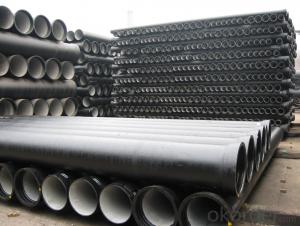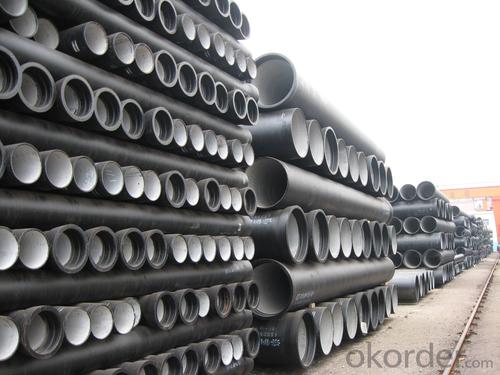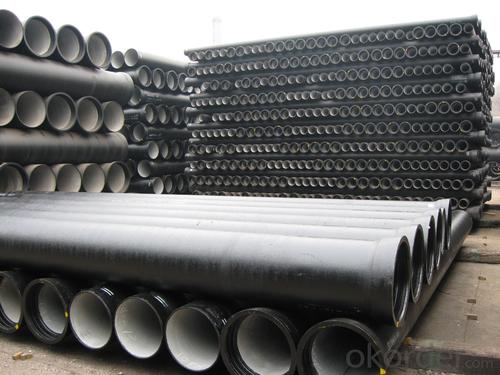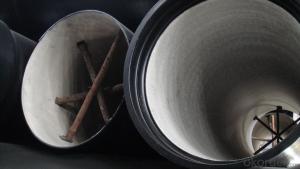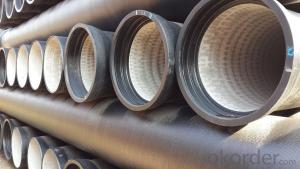Ductile Iron Pipe DN600
OKorder Service Pledge
Quality Product, Order Online Tracking, Timely Delivery
OKorder Financial Service
Credit Rating, Credit Services, Credit Purchasing
You Might Also Like
Specifications
Quick Details
| Place of Origin: | China (Mainland) | Brand Name: | CMAX | Model Number: | T type / K type / Flange type |
| Length: | 6m / 5.7m / Negotiable | Standard: | ISO2531 / EN545 / EN598 | Application: | Potable / Sewage water |
| Diameter: | DN80~DN2200 | Shape: | Round | Hardness: | 230 |
| Pipe Wall Thickness: | standard | Pull Strength: | 420 | Yield (≥ MPa): | 300 |
| Material: | Ductile Iron | Type: | Centrifugal ductile cast iron pipe | Certification: | ISO2531 / EN545 / EN598 |
| Outer Diameter: | 80-2200 | Thickness: | standard | Specification: | DN80~DN2200 |
| |
The advantages to the customer:
Trustworthy financial strength.
One-stop shopping.
Fast and efficient service.
Coordination of shipments from multiple plants.
Specialists of the overseas shipping process.
A more competitive price.
- Q: Can ductile iron pipes be used for trench crossings?
- Yes, ductile iron pipes can be used for trench crossings. Ductile iron pipes are known for their high strength and durability, making them suitable for various applications including trench crossings. They have the ability to withstand heavy loads and provide increased resistance to external forces, making them a reliable choice for such purposes.
- Q: Can ductile iron pipes be used for pressure reducing stations?
- Ductile iron pipes are indeed capable of being utilized in pressure reducing stations. Renowned for their robustness and resilience, these pipes are well-suited for managing applications involving high pressure. Their exceptional resistance to corrosion allows them to endure the mechanical pressures and strains typically associated with pressure reducing stations. Moreover, the smooth interior surface of ductile iron pipes minimizes friction losses and contributes to maintaining a consistent and regulated pressure within the system. Consequently, it can be concluded that ductile iron pipes are a dependable and frequently employed material in pressure reducing stations.
- Q: What are the different types of fittings available for ductile iron pipe?
- There are several types of fittings available for ductile iron pipe, including elbow fittings, tee fittings, cross fittings, reducer fittings, flanged fittings, and mechanical joint fittings. These fittings are designed to connect and redirect the flow of the pipe, ensuring a secure and efficient system.
- Q: How do ductile iron pipes handle ground movement near rivers and lakes?
- Ductile iron pipes are well-suited to handle ground movement near rivers and lakes due to their unique properties and construction. These pipes are made from a type of cast iron that is known for its high strength and flexibility, making them highly resistant to ground movement and other external forces. One of the key features of ductile iron pipes is their ability to withstand bending and stretching without breaking. This flexibility allows the pipes to adapt to ground movements, whether they are caused by natural factors like soil settling, erosion, or even seismic activity. The pipes can absorb and distribute the stress caused by ground movement, reducing the risk of cracks or fractures. Additionally, ductile iron pipes have a high impact resistance, which means they can withstand external forces such as pressure from shifting soil or heavy equipment. This makes them less susceptible to damage during ground movements near rivers and lakes where erosion or flooding can occur. Furthermore, ductile iron pipes have a smooth internal surface, which reduces friction and resistance to flow. This ensures efficient water transportation even in areas with ground movement, preventing any potential blockages or disruptions to the water supply system. To enhance their resistance to ground movement, ductile iron pipes are often installed using flexible joints, such as restrained joints or push-on joints, depending on the specific project requirements. These joints allow the pipes to move slightly without causing damage to the overall system, providing additional protection against ground movement near rivers and lakes. In summary, ductile iron pipes are highly capable of handling ground movement near rivers and lakes due to their strength, flexibility, impact resistance, and smooth internal surface. These qualities make them a reliable choice for water transportation systems in areas prone to ground movement, ensuring a durable and efficient infrastructure for the supply of water.
- Q: What is the expected joint flexibility of ductile iron pipes?
- The expected joint flexibility of ductile iron pipes is typically high, as they are designed to accommodate slight movements and stresses caused by ground settlement or thermal expansion and contraction.
- Q: What is the excavation width of ductile iron pipes with diameters greater than 1400?
- Because of differences in depth and soil properties, the excavation width is differentUsually to ensure that the width of bottom surface on both sides of the 600 1400+ manual operation. (such a large pipe flange bolt, the tool is not easy to expand, so the need for manual operation. So wide)
- Q: DN1800 can the length of ductile iron pipes be several meters? What is the total weight?
- Ductile iron pipe is a kind of cast iron pipe.
- Q: What are the common causes of failure in ductile iron pipes?
- The common causes of failure in ductile iron pipes include corrosion, external loading, ground movement, manufacturing defects, and improper installation or maintenance.
- Q: Can ductile iron pipes be used for both water and sewer applications?
- Ductile iron pipes are versatile and can be utilized for water and sewer purposes. These pipes exhibit remarkable durability and exceptional corrosion resistance, rendering them appropriate for transporting both drinkable water and wastewater. Furthermore, they possess the ability to endure high pressure and resist external loads, making them a perfect fit for underground installations. Additionally, these pipes boast a lengthy lifespan and necessitate minimal upkeep, thereby offering a cost-effective option for water and sewer systems.
- Q: Can ductile iron pipe be used for stormwater systems?
- Yes, ductile iron pipe can be used for stormwater systems. It is a suitable material choice due to its strength, durability, and resistance to corrosion, making it capable of withstanding the demands of stormwater drainage systems.
Send your message to us
Ductile Iron Pipe DN600
OKorder Service Pledge
Quality Product, Order Online Tracking, Timely Delivery
OKorder Financial Service
Credit Rating, Credit Services, Credit Purchasing
Similar products
Hot products
Hot Searches
Related keywords



